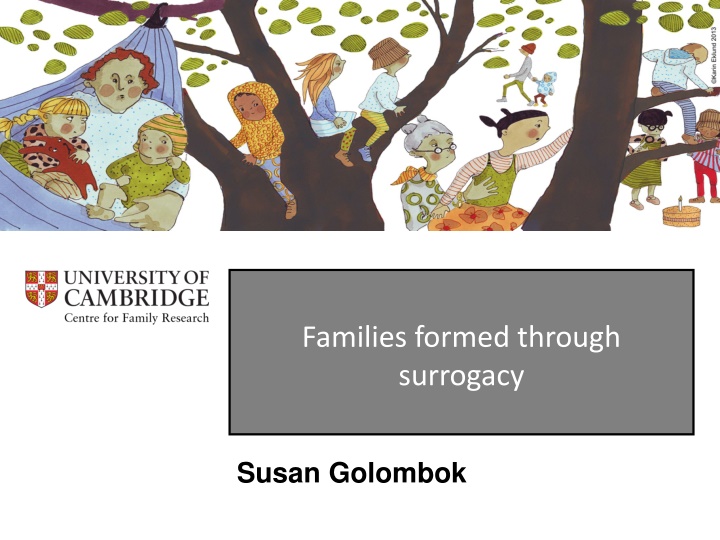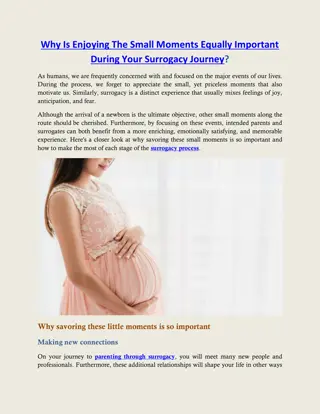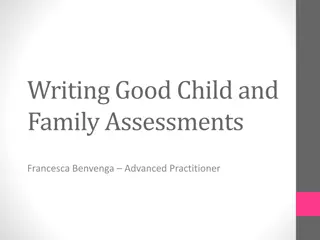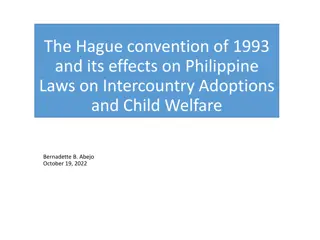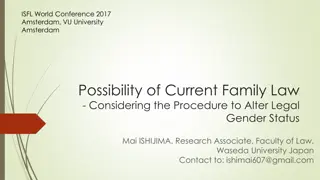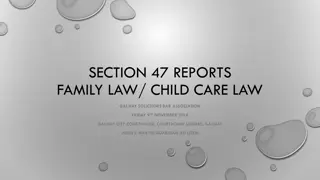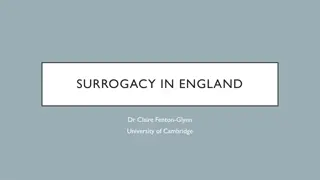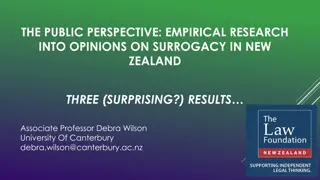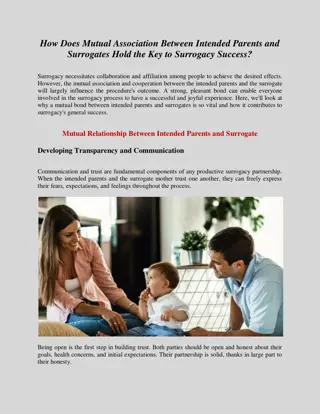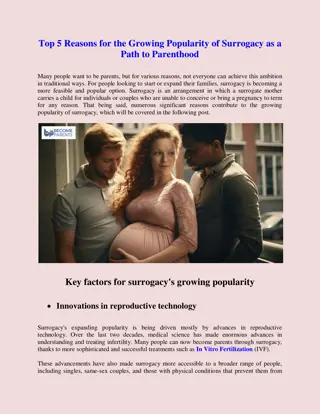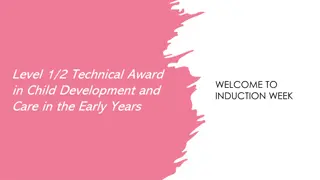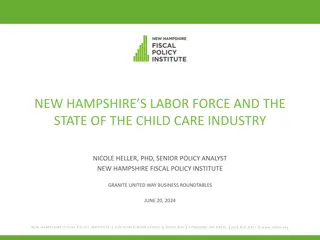The Impact of Surrogacy on Family Dynamics and Child Development
Research conducted by Susan Golombok examines surrogacy families, highlighting concerns, comparisons with natural conception families, and the emotional dynamics within such families. The study explores parent-child relationships, psychological effects on children, and the evolving relationships with surrogates over time. Assessments conducted at various ages provide insights into the quality of relationships, psychological adjustment of children, and parental involvement in surrogacy families. Initial findings suggest higher warmth and sensitivity among surrogacy parents towards infants, indicating potential differences in family dynamics.
Download Presentation

Please find below an Image/Link to download the presentation.
The content on the website is provided AS IS for your information and personal use only. It may not be sold, licensed, or shared on other websites without obtaining consent from the author.If you encounter any issues during the download, it is possible that the publisher has removed the file from their server.
You are allowed to download the files provided on this website for personal or commercial use, subject to the condition that they are used lawfully. All files are the property of their respective owners.
The content on the website is provided AS IS for your information and personal use only. It may not be sold, licensed, or shared on other websites without obtaining consent from the author.
E N D
Presentation Transcript
Families formed through surrogacy Susan Golombok
Studies of Surrogacy Families at the Centre for Family Research Longitudinal study of surrogacy families with heterosexual parents Study of gay father families formed through surrogacy
Concerns about surrogacy families No opportunity for pre-natal bonding Surrogate may remain in contact with family as child grows up Disapproval from family and friends Psychological harm to children from having been relinquished by surrogate Especially if surrogate is the genetic mother and money has changed hands
The Sample 42 surrogacy families Recruited through Office of National Statistics and COTS 51 egg donation families To control for third party assisted reproduction 80 natural conception families Matched as closely as possible to assisted reproduction families
Surrogacy families 38% gestational surrogacy and 62% traditional surrogacy 31% known and 69% unknown surrogates
Research questions Do surrogacy families differ from egg donation or natural conception families with respect to: the quality of relationships between parents and their children the psychological adjustment of the children How do children themselves feel about being born through surrogacy How does relationship with surrogate turn out over time
Assessments All children born at the millennium Data from mothers, fathers, children & teachers Interviews, observational assessments, questionnaires, ratings by child psychiatrist Assessments at age: 1 year 2 years 3 years 7 years 10 years 14 years
Age 1: Comparisons between surrogacy and natural conception families Surrogacy mothers and fathers showed greater warmth and sensitivity toward infants and greater enjoyment of parenting Surrogacy mothers and fathers showed higher levels of emotional-involvement with infants
Age 2: Comparisons between surrogacy and natural conception families Surrogacy mothers showed greater pleasure in their children and lower levels of anger, guilt and disappointment with their children Surrogacy fathers showed lower levels of parenting stress
Age 2: Toddler adjustment No differences in social, emotional or cognitive development identified between three family types
Age 3: Comparisons between surrogacy and natural conception families Differences identified reflected greater warmth and greater interaction among surrogacy mothers
Age 7 assessment By age 7, children have developed a more sophisticated understanding of biological inheritance and of the meaning of the absence of a biological connection to parents Almost all parents had told their children about surrogacy by age 7
Age 7: Mother-child relationships No differences between surrogacy mothers and natural conception mothers for interview assessment of quality of mother-child relationships All family types showed positive mother-child interaction in the observational assessment
Age 7 Child adjustment Surrogacy children functioning within normal range However, they showed raised levels of adjustment difficulties compared to children in other family types Similar to internationally adopted children at age 7 which is attributed to the need to deal with identity issues at an early age
Age 10 Child adjustment Raised levels of difficulties shown by surrogacy children at age 7 had disappeared by age 10 Same is true of internationally adopted children whose difficulties also declined by adolescence
Adolescence Issues relating to identity and autonomy become salient Difficulties between parents and children more likely to arise Adolescence presents specific challenges for adopted children Identity and adjustment Adolescence presents specific challenges for adopted parents Communication about adoption
Age 14 Findings More positive mother-child relationships in surrogacy families as rated by mothers and adolescents Adolescents born through surrogacy showed high levels of psychological adjustment
Childrens relationship with surrogate at ages 7 and 10 She was really kind about. like carrying me in her tummy I think she is kind and she s lovely and funny I feel fine. I don t feel bad or cross in any way. It s just pretty much nature so I can t do anything about it. I wouldn t like to do anything about it
Childrens thoughts and feeling at age 14 I don't really mind. It doesn't really affect my daily life. Fine just normal. I know its like, different but like.....I don't get like emotional or anything, it's just like talking about anything else. I didn't really care to be honest. I felt special, and quite privileged really. I quite like talking about it because it's an interesting fact about me.
Parents relationship with surrogate Parents generally reported a positive relationship with the surrogate from pregnancy to age 10 Frequency of contact declined over time 60% of families still in touch by age 10 Most likely to have lost contact with previously unknown genetic surrogates
Gay father families through surrogacy Study in US 40 gay father families 55 lesbian mother families Children aged 3-9 years
Gay father families formed through surrogacy Children conceived using the egg of a donor, born to a surrogate mother, and raised by two fathers, one of whom lacks a genetic connection to the child.
Design Gay father families studied in comparison with lesbian mother families formed through donor insemination Large body of research showing that children with lesbian mothers do not differ in psychological adjustment from children with heterosexual parents. To control for the non-heterosexual orientation of the parents and the use of third-party assisted reproduction
Research questions Does the quality of parenting differ between gay father and lesbian mother families? Does the psychological adjustment of children differ between gay father and lesbian mother families?
Findings: Parent-child relationship quality No differences between gay father and lesbian mother families in positive parenting, negative parenting or perceived stigma High levels of positive parenting and low levels of negative parenting
Findings: Child adjustment (SDQ) Low levels of behavioural and emotional problems in children Well below general population norms and highly correlated with teachers scores No differences in behavioural problems Lower emotional problems on children of gay fathers Not associated with family income
Findings: Ratings by child psychiatrist No difference in child disorder between family types 2 children (5%) in gay father families showed a definite disorder 1 with emotional problems and 1 with behaviour problems Below general population norms 2 children (9%) in lesbian mother families showed a definite disorder 1 with emotional problems and 1 with behaviour problems Similar to general population norms
Factors associated with child adjustment Perceived stigma, positive parenting and negative parenting were entered into a regression analysis as predictors of children s emotional and emotional problems Higher levels of perceived stigma and higher levels of negative parenting associated with higher levels of behavioural problems
The surrogacy arrangement 36/40 couples used gestational surrogate and egg donor In 38/40 couples the surrogate was previously unknown In 36 gestational surrogacy arrangements, almost all couples used a previously unknown egg donor Majority of donors were open-identity
Contact with surrogate and egg donor Fathers were more likely to maintain contact with surrogate (85%) than egg donor (31%) In year preceding the study, 53% of parents had seen the surrogate whereas 8% had seen egg donor Also kept in contact through Facebook and email
Quality of relationship with surrogate Large majority of fathers content with level of contact with surrogate Discontent fathers wanted more contact Only 1 family reported a negative relationship with surrogate The others described the relationship in positive or neutral terms 28% of children who were in contact with the surrogate had a close relationship with her
Quality of relationship with surrogate She ll always be special in our lives, she will always have a place there, we will always remain in contact if she wants to... Our surrogate is a huge part of our life. We have a great relationship, she is like a relative to us. ...we re very close to her husband. It was a real bonding experience for us, I think they re probably some of the closest people to us really
Quality of relationship with surrogate The type of relationship we wanted to have was one of someone who is almost like a family member, but more of like a distant cousin.... it s more of a sort of distant family member who comes into their lives from time to time. We re very different people... She ll always be special in our lives, she will always have a place there, we will always remain in contact if she wants to... the way that we ve always told the story is that they helped but there isn t any real direct connection to her.
Childs relationship with surrogate They love when she comes. They are fond of her and of her sons. She has three sons, and our children just adore them. If she comes, she brings presents, we do something special, we stay up later or we go to the movies, so it is almost like when a godparent visits. To them, it s always very special and they love it. They get along. He is excited when we go down there and then we spend time with her, and he loves her kids.
Childs relationship with surrogate Our daughter doesn t act differently towards her than to other adults that we ve introduced her to. There are other adults that she has a much closer rapport with than the surrogate. When anyone special comes over to the house, he gets along with them. She and her husband are our special visitors. He doesn t react to her any differently than he does with other special visitors.
Disclosure to the child 83% of fathers had begun to tell their children about their genetic origins Of those, only 30% had disclosed the use of a donated egg Only 17% had disclosed who was the genetic father Level of disclosure was associated with the age of the child
Conclusions The findings of empirical studies of surrogacy families point to positive family relationships and well adjusted children Family structure gender, sexual orientation and biological relatedness of parents matters less for children than quality of family relationships
This research was funded by the Wellcome Trust and the US National Institutes for Health
